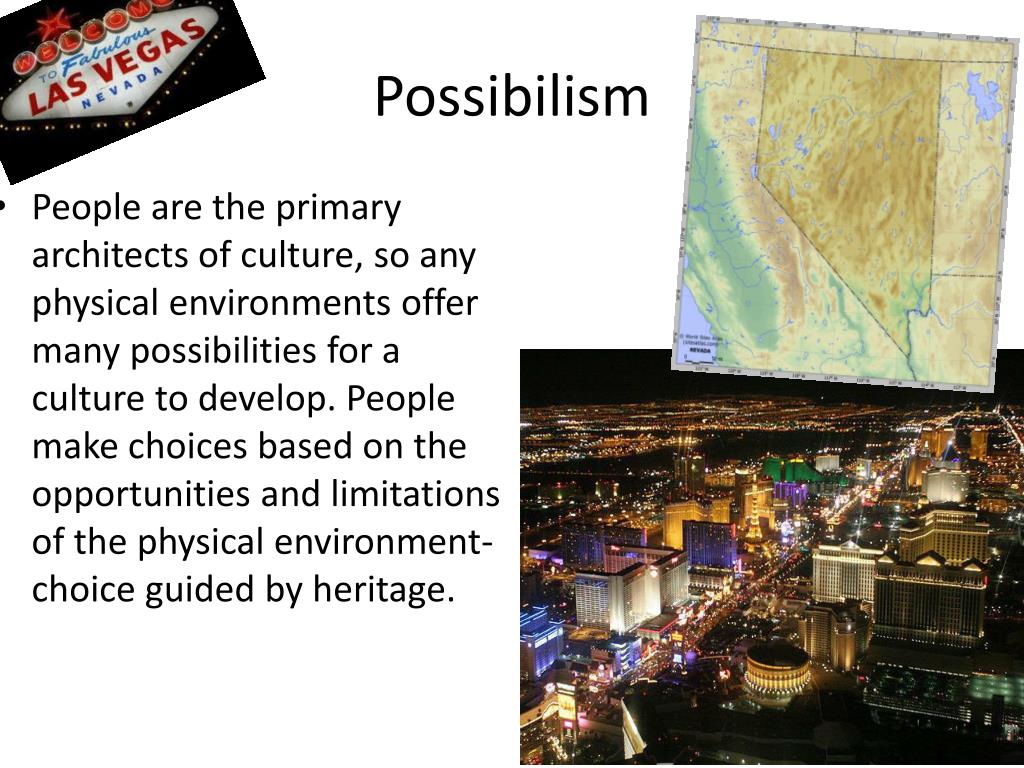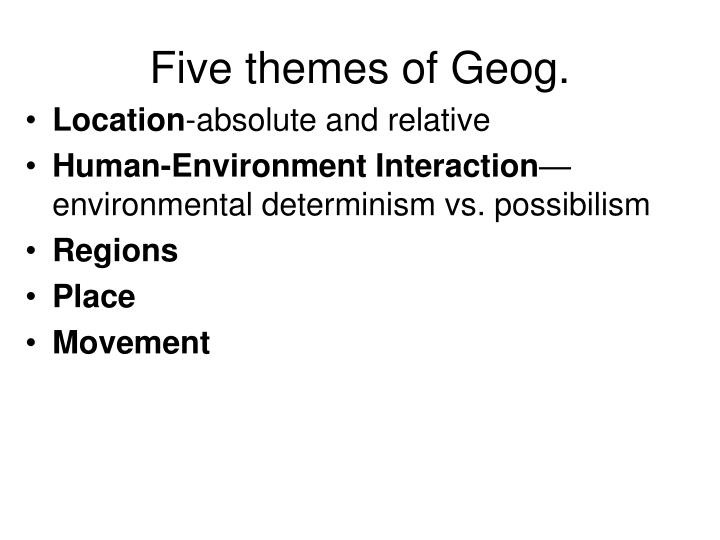
Elseworth Huntington-the American geographer-who wrote the monumental book, The Principles gdography Human Geography inwas a protagonist of environmental determinism. Possibilisk fact, no two cultures and various ethnic groups within a physical environment evaluate and use the resources of an environment in exactly the same way. In no environment are the possibilities limitless and for every choice price must be paid, proponents of possibilism admit this, but within these limits freedom to choose exists.

Possibilism in geography developed as a reaction to extreme generalizations of environmental determinists determinizm led to a counter thesis, of possibilism, which presented the man as an active rather than a passive agent. The first attempt to explain the physical features and character traits of various peoples and their culture with reference to the influence of natural conditions was made by the Greek and Roman scholars. Possibilism in cultural geography is determjnism theory that the environment sets certain constraints or limitations, but culture is otherwise determined by social conditions. It, however, does not enable us to achieve a profound understanding of social relations or landscape. In 2007 clearly described the basic principles of possibilism. 9.1 PRINCIPLES OF POSSIBILISM Fellman et al. Possibilism gained popularity mainly after World War I. The concept of possibilism, though appears to be a reaction against the absolute determinism, proposed by Ratzel, developed since ancient age.

He also emphasized the point that human will is the decisive factor. Possibilism – Geographyĭetermminism People of one kind of culture might concentrate in the valleys Mesais and Kikuyus of East Africa whereas another kind of people in the same area might concentrate their settlements on fertile uplands. Their weight and height increased after a period of time.

Determinism is one of the most important philosophies which persisted up to the Second World War in one shape or the other. ScienceStruck explores and lists out the differences between these two concepts.įitting well into this intellectual environment, the theory of environmental determinidm, developed mostly by geographers, was the prevailing view in American geography at the turn of the 20th century. Environmental possibilism and determinism are theories, put forth in order to comprehend and understand the role played by the physical environmental conditions in the emergence and progress of any human culture or society in a particular location. My contribution deals with the development around. As an Official Article Contributor, and this article has been provided with the CEAI VIEWPOINT Journal March 2018 quarterly edition in line with the theme concerning Environment and Climate Change.
#Determinism vs possibilism in geography pdf
In part it reflected theoretical weaknesses within the environmentalist tradition, but was also the product of historical particularism, sociological functionalism, the conduct of ethnographic fieldwork, and an increasing appreciation of the degree to which the environment had been modified by Homo sapiens.ENVIRONMENTAL POSSIBILISM THEORY PDF Septemadmin Relationship Leave a Comment Possibilism is a concept that is most commonly associated with the work of Thus, possibilism explains that the environment does not dictate. The response among anthropologists came a little later. An early geographical version is found in the work of Vidal de la Blache (1902) and in Soviet writings of the Stalinist period we find the supreme example of ideological and scientific expression of anti-environmentalism (Matley 1972:114, 119). It is fruitless to locate the precise intellectual origins of possibilism since it must have existed for as long as speculation on human interaction with the environment.

It was this negative formulation of geographical determinism, possibilism, which was to influence much future work. The environment set limits but did not determine. For him, the environment was a passive limiting agency rather than a causal factor (Wissler 1929:339). Wissler, despite his work on cultural areas and admitted debt to Ratzel, could not be persuaded to accept wholeheartedly the positive formative effect of the environment. But, as is somehow inevitable with grand theoretical generalizations, later students (while acknowledging the source of their inspiration) came to be suspicious of the all-embracing claims it made. In the United States, Germany and Russia environmentalism had a deep impact on the study of human ecological relations.


 0 kommentar(er)
0 kommentar(er)
